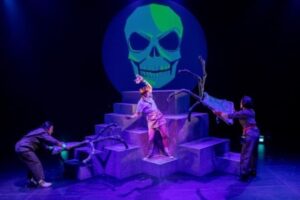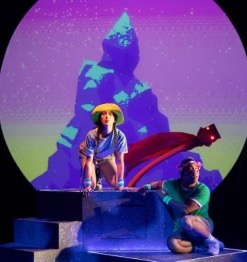By Jennifer Kokai and Oliver Kokai-Means. Riverside’s National Theatre of Parramatta. Riverside Theatres Parramatta. Director: Warwick Doddrell. May 29 – June 5, 2021
Reviewed : May 29, 2021

Surveys tell us that more and more kids suffer from anxiety – and that the pandemic and its associated problems haven’t helped. When co-writer Oliver Kokai-Means was 9 he suffered so badly from anxiety that he couldn’t go to school. No one, including his teachers, understood how sad and alone he felt. He, and his playwright mother, Jennifer Kokai, decided to write a play to try and help people understand what it feels like to be so anxious when you are young – and to suggest some ways to cope with that feeling.
From this came Zombie Thoughts – an inter-active choose-your-own adventure based on popular video games and featuring anxiety-ridden Sam and his caring friend Pig. They are led through the game by the audience, who decide which actors will play each character, the hats they will wear, and which of Sam’s demons they will face.
First performed in Salt Lake City, Utah, in 2018 when Oliver was 11, the play has had amazing success across America, with productions in Chicago, Washington DC, Maryland, Florida and Honolulu. A touring production in 2018 played at 50 elementary schools. In 2020, when the pandemic closed theatres, the Montana Rep Company liaised to produce a digital version with which kids can interact, just as they do in the stage version.
The play obviously strikes the right chord for kids, adults … and educators.
Firstly, it isn’t patronising.

Secondly, it doesn’t ‘water down’ just how debilitating anxiety can be. In fact, it goes pretty deeply into the frightening things kids imagine, often far more real than ‘tigers under the bed’.
Thirdly, it’s a game! The audience is ‘the player’ with the power. They decide which actors will play Sam and Pig, and which hats they will wear (all of pig’s hats have little pink ears!). It is they who guide Sam and Pig through the game and the scary levels based on Sam’s fears – like ghost houses, dark caves, deep abysses, vampire bats, zombies … or something happening his parents.
In this version of the play, the Machine is a real Narrator rather than just a voice behind a screen. This means the game seems more personal, and that the audience can feel even more involved, especially when someone like Monica Sayers is playing the part. Sayers is vibrant, commanding, expressive – and funny. She whips around the glitzy Minecraft stage, working the audience, demanding they make quick decisions that take them up the levels of Sam’s anxiety. She makes the ghostly noises in the haunted house, manipulates vampire bats on bendy poles, becomes the Shark or the Wolf (whichever the audience has chosen) in a scary mask, and the disembodied voice of ‘Mum’ who won’t come when Sam calls. Sayers pushes the pressure and urgency of the game, making it … real?

Sam or Pig are played by Jose Talite or Emma O’Sullivan, who has come late to this production following Annie Stafford’s reluctant need to give up the role. At the beginning of the game the audience decides which will be intelligent, anxious Sam, or goofy, calm, pun-loving Pig. Like the kids they portray, they must be fit and flexible. They are, after all, the avatars in a fast video game. They jump up and down the levels of the sparkly Minecraft set, as they are attacked by bats, a wolf (or a shark). They cringe away from zombie arms that reach out to grab them or the huge skull that dictates from the screen behind them. They are funny at times, breaking the tension that builds from Sam’s anxiety, but sustain the fear that bubbles constantly. Both find their ‘inner kid’ in very lively, physical performances.
The play is about Sam’s anxiety and it never detracts from the seriousness of the condition nor the difficulty of overcoming it. It makes some suggestions, including breathing slowly, “in through the nose, out through the mouth” … and Sam’s own insightful words: “I am the boss of my brain. It is not the boss of me”.
We all have fears. We all deal with them differently. Zombie Thoughts lets children know that they are not alone – that others understand, that there is a way out of the “abyss”.
Also published in Stage Whispers magazine